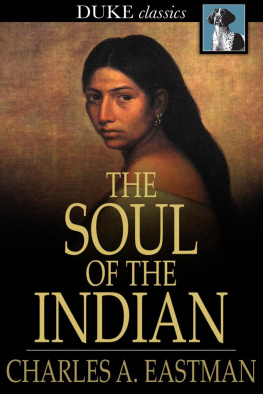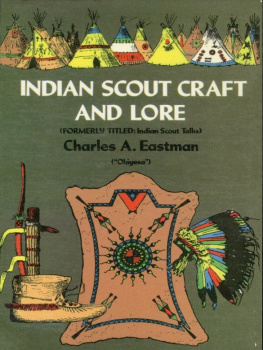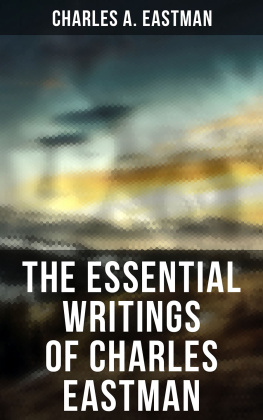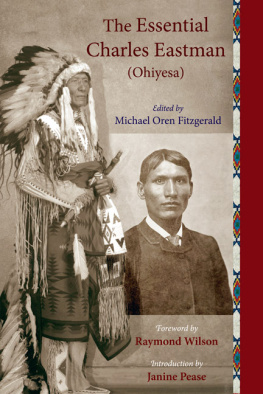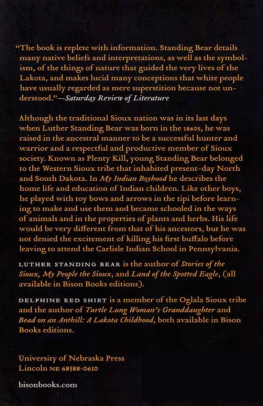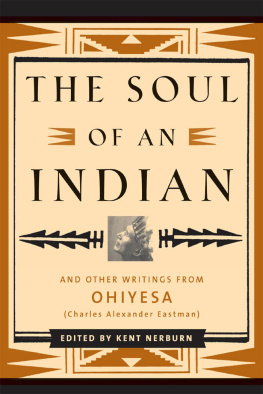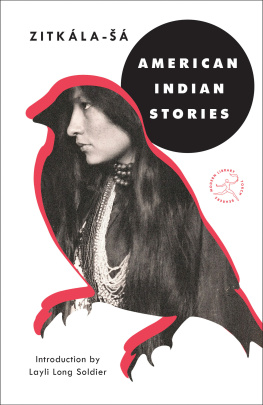Eastman, Charles Alexander, 1858-1939. Indian Boyhood
Electronic Text Center, University of Virginia Library
| Table of Contents for this work |
| All on-line databases | Etext Center Homepage |
About the electronic version
Indian Boyhood
Eastman, Charles Alexander, 1858-1939
Creation of machine-readable version: Judy Boss
Creation of digital images: University of Virginia Library Electronic Text Center.
Conversion to TEI.2-conformant markup: University of Virginia Library Electronic Text Center. ca. 330 kilobytes
This version available from the University of Virginia Library.
Charlottesville, Va.
http://etext.lib.virginia.edu/modeng/modengE.browse.html
Copyright 1999, by the Rector and Visitors of the University of Virginia
http://etext.lib.virginia.edu/
Commercial use prohibited; all usage governed by our Conditions of Use:http://etext.lib.virginia.edu/conditions.html
1995 About the print version
Indian Boyhood
Indian Boyhood
Charles Alexander Eastman (Ohiyesa) 1902
Note: Created from the University of Nebraska Press, Omaha, 1991reprint.
Prepared for the University of Virginia Library Electronic Text Center.
Spell-check and verification made against printed text
Published: 1902
English non-fiction; prose Native AmericanYoung ReadersLCSH engraving/painting/illustration, etc. 24-bit color; 300 dpi Revisions to the electronic version
April 1993 corrector Peter J. Kastor, University of Virginia Library Electronic Text Center.
TEI tagging added, ambiguous line-ends removed
July 1994 corrector Jamie L Spriggs, University of Virginia Library Electronic Text Center.
Updated header, checked and updated TEI markup
etext@virginia.edu. Commercial use prohibited; all usage governed by our Conditions of Use: http://etext.lib.virginia.edu/conditions.html
Part I: Earliest Recollections
Hadakah, `The Pitiful Last
-3
WHAT boy would not be an Indian for a while when he thinks of the freest life in the world? This life was mine. Every day there was a real hunt. There was real game. Occasionally there was a medicine dance away off in the woods where no one could disturb us, in which the boys impersonated their elders, Brave Bull, Standing Elk, High Hawk, Medicine Bear, and the rest. They painted and imitated their fathers and grandfathers to the minutest detail, and accurately too, because they had seen the real thing all their lives.
We were not only good mimics but we were close students of nature. We studied the habits of animals just as you study your books. We watched the men of our people and represented them in our play; then learned to emulate them in our lives.
No people have a better use of their five senses
-4
than the children of the wilderness. We could smell as well as hear and see. We could feel and taste as well as we could see and hear. Nowhere has the memory been more fully developed than in the wild life, and I can still see wherein I owe much to my early training.
Of course I myself do not remember when I first saw the day, but my brothers have often recalled the event with much mirth; for it was a custom of the Sioux that when a boy was born his brother must plunge into the water, or roll in the snow naked if it was winter time; and if he was not big enough to do either of these himself, water was thrown on him. If the new-born had a sister, she must be immersed. The idea was that a warrior had come to camp, and the other children must display some act of hardihood.
I was so unfortunate as to be the youngest of five children who, soon after I was born, were left motherless. I had to bear the humiliating name Hakadah, meaning the pitiful last, until I should earn a more dignified and appropriate name. I was regarded as little more than a plaything by the rest of the children.
My mother, who was known as the handsomest woman of all the Spirit Lake and Leaf Dweller Sioux, was dangerously ill, and one of the medicine
-5
men who attended her said: Another medicine man has come into existence, but the mother must die. Therefore let him bear the name Mysterious Medicine. But one of the bystanders hastily interfered, saying that an uncle of the child already bore that name, so, for the time, I was only Hakadah.
My beautiful mother, sometimes called the Demi-Goddess of the Sioux, who tradition says had every feature of a Caucasian descent with the exception of her luxuriant black hair and deep black eyes, held me tightly to her bosom upon her death-bed, while she whispered a few words to her mother-in-law. She said: I give you this boy for your own. I cannot trust my own mother with him; she will neglect him and he will surely die.
The woman to whom these words were spoken was below the average in stature, remarkably active for her age (she was then fully sixty), and possessed of as much goodness as intelligence. My mothers judgment concerning her own mother was well founded, for soon after her death that old lady appeared, and declared that Hakadah was too young to live without a mother. She offered to keep me until I died, and then she would put me in my mothers grave. Of course
-6
my other grandmother denounced the suggestion as a very wicked one, and refused to give me up.
The babe was done up as usual in a movable cradle made from an oak board two and a half feet long and one and a half feet wide. On one side of it was nailed with brass-headed tacks the richly-embroidered sack, which was open in front and laced up and down with buckskin strings. Over the arms of the infant was a wooden bow, the ends of which were firmly attached to the board, so that if the cradle should fall the childs head and face would be protected. On this bow were hung curious playthings strings of artistically carved bones and hoofs of deer, which rattled when the little hands moved them.
In this upright cradle I lived, played and slept the greater part of the time during the first few months of my life. Whether I was made to lean against a lodge pole or was suspended from a bough of a tree, while my grandmother cut wood, or whether I was carried on her back, or conveniently balanced by another child in a similar cradle hung on the opposite side of a pony, I was still in my oaken bed.
This grandmother, who had already lived through sixty years of hardships, was a wonder to
-7
the young maidens of the tribe. She showed no less enthusiasm over Hakadah than she had done when she held her first-born, the boys father, in her arms. Every little attention that is due to a loved child she performed with much skill and devotion. She made all my scanty garments and my tiny moccasins with a great deal of taste. It was said by all that I could not have had more attention had my mother been living.
Uncheedah (grandmother) was a great singer. Sometimes, when Hakadah wakened too early in the morning, she would sing to him something like the following lullaby:
Sleep, sleep, my boy, the Chippewas
Are far away are far away.
Sleep, sleep, my boy; prepare to meet
The foe by day the foe by day!
The cowards will not dare to fight
Till morning break till morning break.
Sleep, sleep, my child, while still tis night;
Then bravely wake then bravely wake!
The Dakota women were wont to cut and bring their fuel from the woods and, in fact, to perform most of the drudgery of the camp. This of necessity fell to their lot, because the men must follow the game during the day. Very often my grandmother carried me with her on these excursions;
-8
and while she worked it was her habit to suspend me from a wild grape vine or a springy bough, so that the least breeze would swing the cradle to and fro.
Next page


